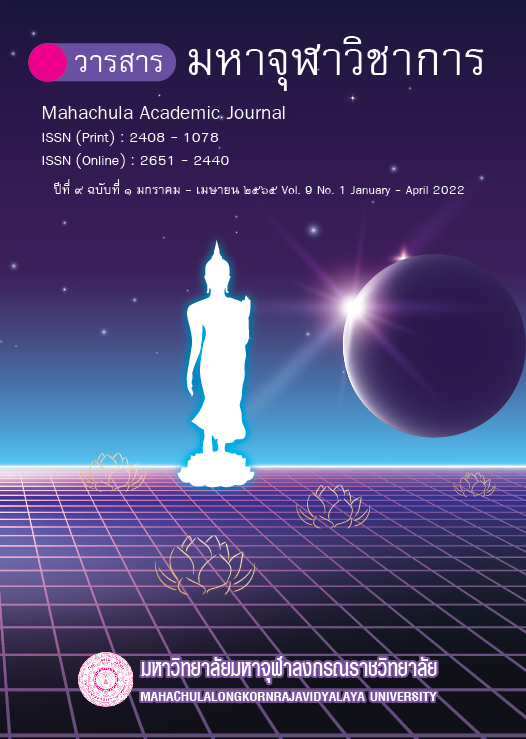An Analytical Study of the Development of Human Being Towards Deva according to Puññakiriyãvatthu
Main Article Content
Abstract
In the research entitled “An Analytical Study of the Development of Human Being Towards Deva according to Puññakiriyãvatthu”, three objectives were made: (1) to study the Deva in Theravada Buddhism scriptures, (2) to study the principles of Dhamma which are conducive to become the Deva according to Puññakiriyãvatthu, and (3) to analyze the development of human being towards Deva according to Puññakiriyãvatthu. This is the qualitative research integrates the method of collecting data from research documents and in-depth interviews of eight Buddhist academicians.
The results of the research were found that in Buddhist scriptures the deva is classified into three types: Sammati-deva: this deva is caused by convention, Upapatti-deva: this deva is caused by rebirth and Visuddhi-deva: this deva is caused by purification. In this thesis, only the deva caused by rebirth is mentioned and is classified into six celestial realms. Puññakiriyãvatthu is briefly separated into three kinds and thoroughly into ten kinds. In this thesis, only the Puññakiriyãvatthu is briefly classified into three groups such as donating, keeping precepts and meditating.
Human beings who wish to become celestial beings must get themselves developed through three groups of Puññakiriyãvatthu: (1) the self-development is done by donating where before donating, they make their own mind good with their recognizing that ‘when we donate, we will bury the treasure which is caused to be their future belongings’; while donating, they believe their merits with their recognizing that ‘we cannot cling to the essence of the inessential belongings’; after donating, they are trained to be delighted with their recognizing that ‘it is so good for us to donate according to the pundit’s description’; and everything should be deliberately donated with their own hands, (2) the self-development is done by keeping precepts where keeping their own actions and words truly and politely with all-time keeping of five precepts or observing eight precepts on Lunar Observance days are practiced, and (3) the self-development is done by meditating where keeping their own minds peacefully by means of the appearance of wisdom is observed.
Article Details

This work is licensed under a Creative Commons Attribution-NonCommercial-NoDerivatives 4.0 International License.
References
พระพรหมบัณฑิต (ประยูร ธมฺมจิตฺโต). พระไตรปิฎกฉบับสากล: วิธีธรรมจากพุทธปัญญา. พระนครศรีอยุธยา : มหาวิทยาลัยมหาจุฬาลงกรณราชวิทยาลัย, ๒๕๖๑.
มหาจุฬาลงกรณราชวิทยาลัย. พระไตรปิฎกภาษาไทย ฉบับมหาจุฬาลงกรณราชวิทยาลัย. กรุงเทพมหานคร : โรงพิมพ์มหาจุฬาลงกรณราชวิทยาลัย, ๒๕๓๙.
มหาจุฬาลงกรณราชวิทยาลัย. อรรถกถา ภาษาไทย ฉบับมหาจุฬาลงกรณราชวิทยาลัย. กรุงเทพมหานคร : โรงพิมพ์มหาจุฬาลงกรณราชวิทยาลัย, ๒๕๕๓.
ราชบัณฑิตยสถาน. พจนานุกรมฉบับราชบัณฑิตยสถาน พ.ศ. ๒๕๔๒. กรุงเทพมหานคร : นานมีบุ๊คส์พับลิเคชั่น, ๒๕๔๖.
วัลโปละ ศรีราหุล. พระธรรมที่พระพุทธเจ้าทรงสอน. ฉบับอังกฤษ – ไทย. แปลโดย นวพร เรืองสกุล. กรุงเทพมหานคร : กองทุนบุญนิธิหอไตร, ๒๕๖๑.
สมเด็จพระพุทธโฆษาจารย์ (ป.อ. ปยุตฺโต). พจนานุกรมพุทธศาสน์ ฉบับประมวลศัพท์. พิมพ์ครั้งที่ ๓๐. กรุงเทพมหานคร : สำนักพิมพ์ผลิธัมม์, ๒๕๕๙.
สมเด็จพระพุทธโฆษาจารย์ (ป.อ. ปยุตฺโต). พุทธธรรมฉบับปรับขยาย เล่ม ๓. พิมพ์ครั้งที่ ๕๒. กรุงเทพมหานคร : สำนักพิมพ์ผลิธัมม์, ๒๕๖๒.


